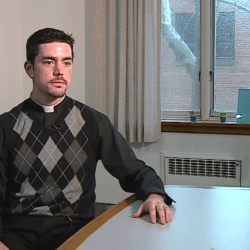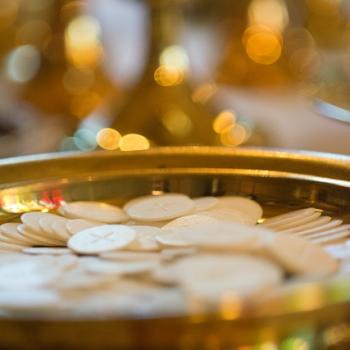Well, it’s over.
Msgr. Joseph Funaro, my pastor emeritus, has been to sent to his rest.
The funeral Mass this morning was beautiful. On a glorious summer Saturday, the church in Forest Hills was packed: two bishops, a couple dozen priests, throngs of friends and family, a small army of altar servers. Music ranged from “Alleluia, Sing to Jesus” for the entrance, “At the Breaking of the Bread” for the offertory, and “Ave Verum” for the communion meditation. Msgr. Funaro, I’m sure, was pleased and proud.
The gospel was the Beatitudes. His longtime friend Fr. Phil Pizzo preached a funny and affectionate homily about Joe Funaro, the good priest, regaling us with how much he loved music and musicals from his days directing the Theater Guild. “We’d go on retreat as we did every year,” Phil explained, “and we’d get in the car. And he’d start singing. For six hours.”
He mentioned something many people didn’t know: Joe’s first career, working as an artist at Paramount, where he drew Casper the Friendly Ghost. “He loved that,” Phil said. “Years later, he’d draw Casper on napkins, scrap paper, anything.”
Phil captured the essence of the man perfectly. There was no one else like him. Talking with friends, family and parishioners over the last few days, you’d hear the same phrases. “Larger than life.” “A memorable man.” “A real character.” “He left a void that will never filled.”
But you’d also hear this same theme again and again—the point Phil drove home so beautifully in his homily: Joe Funaro was a man who loved his priesthood, loved his people, and loved serving God.
He left an enduring legacy at my parish. He took a huge place that was in dire trouble, haunted by financial scandal, and brought it back, Lazarus-like, to new life. Some thought it couldn’t be done. But he did it. Because, of course, nothing is impossible with God.
I remember one telling moment from my Mass of Thanksgiving six years ago. The crippling neuropathy that limited his mobility had advanced to the point where he almost never processed down the long aisle of the church. By that time, he was forced to celebrate Mass seated, from an elevated chair. But that morning, he insisted on processing in. And he insisted on something else. “Deacon,” he said, nodding to my wife as we lined up for the procession, “This morning, I think, Siobhain should walk beside you.” She was lector for the Mass, and would be in the procession anyway.
And so it was that, on that particular morning, for the first time in my life, I carried in the Book of the Gospels into Mass. And for that one Mass, my wife walked at my side. Msgr. Funaro, who had mentored me through my five years of formation—years that weren’t always easy for him or for me—walked behind us every step of the way.
I know it was difficult for him. But he wanted to make that effort for me—a gesture of support, and brotherhood, and love. Symbolically, in that procession, I was taking my place in the clergy of the parish. He wanted to take his place, as well.
As the years went on, and his health failed, he called upon me more and more to preach for him at Sunday Mass. After a while, he stopped asking; it was just understood that I’d preach his Masses every weekend. The experience was challenging, and sometimes daunting. But it was invaluable.
More than a few times, I’ve found myself asking lately, “WWJD?” What would Joe do?
Answering that may be one way to keep his legacy alive, and lead me to a deeper appreciation of what it means to be—as Joe Funaro assuredly was—a faithful servant of the people of God.
God be with you, Joe Funaro. And thank you for helping make me the deacon I am today.
UPDATE: Other posts on this subject:













